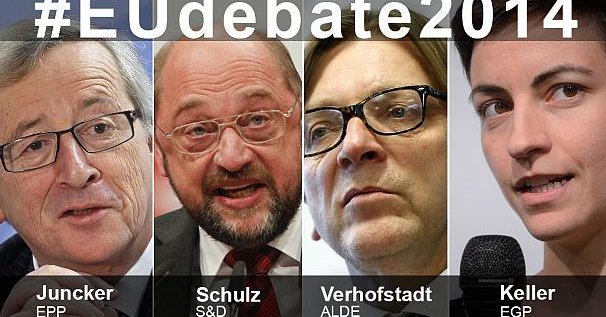The likelihood that the Conservatives (EPP) will remain the strongest force ahead of the Socialists (S&D) after the 22-25 May European Parliament elections has risen ever since a first article of mine on the #ep2014 was published in the end of March. Now, the Liberals (ALDE) have a higher chance to remain in third place (58-62 seats) while the Left (GUE) with 50-51 seats rather needs to battle for the fourth place with the Greens (42-45 seats) instead of the much higher aspirations that they have. Radical elements of the right remain comparatively strong but are much weaker than often portrayed in European media outlets. The first ever public debate with the main candidates of the political parties who run for president of the European Commission gathered on 29 April in Maastricht in an exciting debate that pushed the European public space “into a new dimension.”
Next to the Poll Watch 2014 polls, also the European Parliament is monitoring the various national polls in the 28 member states. The latest surveys all see the EPP in front (213-215 seats). However, the EPP’s lead ahead of the S&D (205-208 seats) is very small and in the margin of error. On their blog, Cunningham and Hix write that there is still a 26% likelihood that the S&D will be ahead of the EPP. A lot of further insightful analysis is provided on Europe Decides or on other pages where you can see how the parties voted on 20 key issues during the last period based on Vote Watch.
When it comes to the radical parties on the far right spectrum, a probable new alliance of far-right extremists would gain currently between 30 to 35 seats out of a total of 751. This obviously presumes that these seven parties (including the French Front Nacional and the Austrian Freedom Party) actually are able to form a bloc which has proven to be difficult in the past. Nonetheless there continues a lot of talk in European media outlets that extremist groups would gain a lot of strength in the European Parliament. According to the polls, this is simply not true. Although radicals will gain in strength, it will be rather minor considering the many crises that Europe has faced during the past six years or so.
As far as one is observing the trends in the different member states, national issues dominate the agenda. Thus, S&D is currently rising in Italy thanks to the Renzi factor. On the other hand, the EPP in Poland was able to win significantly which is interpreted as the impact of the events in Ukraine and many Poles feel that security is a issue of high concern that is better tackled by the Conservatives. However, there is not a European debate going on. As a matter of fact, there is a lack of a European debate on European issues. Although the five candidates for the EU Commission President are touring the EU, this hardly has an impact on the ordinary voters. This might change though during the last month of campaigning.
There was one debate between Jean-Claude Juncker (EPP) and Martin Schulz (S&D) that took place on French TV; however, it was hardly noticed outside France. On 28 April, Euronews broadcasted a historic live debate in Maastricht. It was the first time ever that such a debate took place and although the format hardly allowed more than some insights on the surface, it was a strong showing of the candidates with the exception of Alexis Tsipras (GUE) who did not show up in the first place (read an analysis on my blog). Although there was a lack of issue-based discussions, it was a start to finally have European discussions. On 15 May, there will be another European-wide debate that will be broadcasted by some 20 national TV stations from across the EU. However, major networks do not show this important debate as Jon Worth points out in The New Federalist.
When it comes to the new leadership of the European Commission, the European Parliament continues to press hard that it should be the candidates of the strongest party in the elections in order to reflect the will of EU citizens. In the meantime, however, EU Council President Herman Van Rompuy said that “the difference between the Parliament and those who really decide is very clear to citizens.” This statement clearly disqualified Van Rompuy as it undermines the democratic legitimacy. However, “the old days are over,” as Juncker and Schulz replied unanimously. And yet, names fly around like Christine Lagarde, Pascal Lamy or Mario Monti who could be brought up as “dark-horse candidates” by the Council (particularly the UK and others like Hungary) as an alternative.
The 2014 European Parliament elections are in full swing. Nonetheless, there is the fear that the turnout at the ballots is even less than in 2009 with a record low of just 43%. Hopefully, the TV debates will be able to show faces where the ordinary EU citizen can see European politicians and their ideas and ambitions. This should be a help to know whom to vote for in the respective member state. The candidates should not discuss any longer whether it makes sense to take part at the elections. Rather, they need to present a feasible vision to the 400 million EU citizens eligible to vote to go to the polls by convincing them according to their program of how to solve the many problems that Europe is facing today.


Follow the comments: |
|
